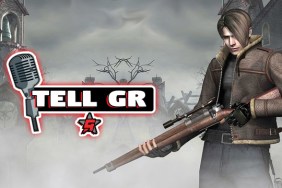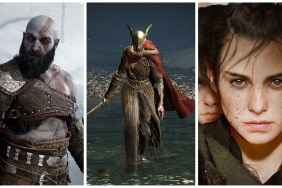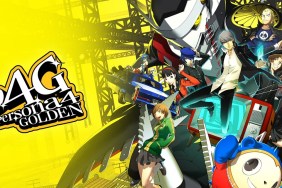Sure, kill the rest of your family, but leave the poor brother alone…
My love affair with the God of War series began, oddly enough, when I was still a self-professed Nintendo fanboy. My then-roommate had obtained a legitimate copy of the original God of War after a burned copy failed to work on his modded PS2 (remember kids – piracy is wrong!), but I ended up the only one to play it. Combine that with my recent change of major to English having rekindled my fascination with the Greek Pantheon, and I was in hack-and-slash, literary revisionist, deicide-fueled heaven.
[image1]Kratos has come a long way since then. The epic campaign to end the gods’ reign through God of War II and III delivered an unstoppable crescendo of violence, intensity, and drama before Kratos’ saga came to a close. But Ghost of Sparta, like Chains of Olympus before it, uses the small screen to go back in time and show a little bit more of Kratos’ past. Unfortunately, in the wake of the unprecedented cinematic nirvana that was GoW III, the new PSP entry feels like a step backward in the overall package as well as the chronology.
Now, before you grab your pitchforks and/or chain blades to come and decapitate me for such a blasphemous statement, let me qualify it by saying that this is a damn good game, as all games in this series are bound to be (especially considering the dearth of quality titles on the PSP). But Ghost of Sparta has the misfortune of arriving after GoW III blew the lid off the series’ limitations on scope and technical achievement. Of course, GoW III was on PS3 and not on PSP; however, Ghost of Sparta still feels dated in much more significant ways than graphics.
The new game is far more akin to the original GoW than the later entries. While the graphics are just stunning (we’ve finally found a PSP game that actually looks better than a PS2 game), the game's design is still closer to GoW I than GoW III. We’re also reduced to three magic spells and one alternate weapon, just like the first one. And the biggest complaint about the original – the lack of boss fights – is on display once again. Does that make it bad? Hell no. But it leaves you wanting in a lot of ways.
Kratos’ quest in this in-between-quel (inter-quel?) is to find and rescue his lost brother Deimos who was taken by the gods as a child to avert the prophecy of their destruction (little did those suckers know, eh?). But before Deimos’ existence is revealed after an incredibly convenient-to-the-plot boss fight, there really doesn’t seem to be much aim to Kratos’ bloodletting – in fact, there were a few times during the game where I just kind of stopped to try and remember why I was in this place and doing this stuff to begin with. I think that without Kratos’ unrelenting drive for vengeance, it’s much harder to keep a God of War plot focused and on point.
[image2]Combat is, as expected, blissfully tight and responsive. It’s tempered by having to put up with that damn thumb stick on the PSP, but that’s a sacrifice that’s really unavoidable. With a lack of the Icarus Wings (the story does take place before GoW II, after all), it plays out more like the first game but with a few welcome additions like the trusty parry mechanic. The item bar introduced in GoW III makes a return, but there’s only one item to use and it merely augments your normal attacks instead of giving you something really new to play with, so it ends up being kind of a wash.
That brings us to the boss fights, or lack thereof. Just like every other game in the series, Ghost of Sparta kicks off with a multi-stage battle with a colossal beast. Unlike later entries, however, bosses are few and far between after that, and none of them ever reach the scale of the first. The last boss is a saving grace, at least; while it may not make up completely for the lackluster boss roster, the final fight is cooler and more exhilarating than any other out of the series.
A couple design choices also contribute to that feeling of regression in the series. For one, while God of War games have always been overwhelmingly linear, the environments usually disguise it pretty well. Here, however, there are a lot of elements to keep you restrictively on track and thereby pull you out of the game: Invisible walls and rubble form boundaries everywhere that Kratos should easily be able to clear with a double jump.
There are also a bunch of segments where the camera zooms in behind Kratos and he can only move forward in a slow walk. This is meant to heighten the drama before the next big action scene, but it really yanks you jarringly out of an obviously fast-paced game. Instead of aiding the drama, it only serves to get you antsy as you wait to be back in full control. If it happened once or twice, it would be fine, but these segments pop up too often and for too long to ignore.
[image3]On the positive side is the new batch of enemy designs. Every time you think they’ve run out of ideas for bad guys, they come up with some unique enemies for the next game. My personal favorite is a four-legged walking statue that teleports, shoots electricity, and carries a gigantic (electrically-charged) stone boulder. If Miyamoto was high when he thought of goombas, these devs must be straight trippin’ (not that I’m insinuating anything, of course).
There’s also a hefty amount more replay value in Ghost of Sparta than the typical GoW experience. On top of the standard Combat Arena and Challenge of the Gods, the Temple of Zeus is a bonus area where you can spend additional orbs unlocking extras like Combat Arena monsters, galleries, and videos. Some of these extras cost hundreds of thousands of orbs, so you’ll have your work cut out for you if you want to get everything.
As an action game, as a PSP game – hell, simply just as a video game – Ghost of Sparta is entertaining and well worth a play. As a God of War game, though, it’s a reluctant step backward, in its design, sparse boss battles, and lack of weapon and magic options. I think that there’s really nowhere this series can or should go after God of War III. Kratos has earned his rest. I’m willing, with a heavy heart, to finally let him go. Are you, Sony?
-
Better-looking than PS2
-
Combat is as good as ever
-
Cool new enemies
-
A lot of orbs to unlock a lot of stuff
-
Lack of bosses
-
Some questionable design choices
-
More like <b>GoW I</b> than the others









